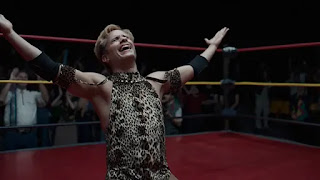Never let it be said that the movies can't teach us things. How useful those things might be is another question.
Putting aside discussions about relevance, I should say that until I saw Cassandro, the story of a gay man who conquered the world of Lucha Libre, I didn't know that Mexican wrestling was a thing -- a very big thing.
I also didn't know that the word "exotico" refers to wrestlers who act in effeminate ways, donning garish costumes in defiance of the macho standards that dominate the ring. I'm not even interested in American wrestling, so it's hardly surprising that my ignorance extended to another country.
Now I know a little bit.
But about the movie:
Gael García Bernal stars as Cassandro, a.k.a Saúl Armendáriz, a resident of El Paso who, from an early age, knew two things: He was gay and he wanted to be a professional wrestler.
As directed by Roger Ross Williams, the movie provides Saul with motivation for his dream, something to do with impressing the severely religious father (Robert Salas) who rejected him for being gay.
Theatrical and unashamedly outlandish, Lucha Libre compares to the world of comic books; matches are replete with heroes and villains who elicit heavy vocal responses from avid audiences.
Sporting blonde hair, Bernal plays Saul without affectation. He's another movie guy with a dream -- only a very specialized one.
The movie makes it clear that Cassandro is a kind of living fiction, a character Saul invents to distinguish himself from other "exoticos." Cassandro would become the first exotico who didn't automatically lose to macho opponents. He'd turn convention on its head and become a crowd favorite.
That's pretty much the story.
Two women play important roles in Saul's life.
A strong Perla De La Rosa portrays Saul's mother. She accepts her son's gayness but cautions him about the dangers posed by a society in the grip of rigid definitions of manhood. She's part mother, part pal.
Saul also develops a relationship with Sabrina (Roberta Colindrez), his trainer. Sabrina helps sharpen Saul's moves and watches as he realizes that he'll benefit from making the transition from a third-tier wrestler named El Topo to the flamboyant Cassandro, an altered version of a name he got from watching a TV show.
Saul's life as a gay man isn't neglected. He develops a romantic relationship with a wrestler called El Commandante (Raul Castillo). As a gay man who's married with children, Castillo's character lives a tormented dual life. He presents himself as straight in the wrestling ring.
Saul knows who he is and has no problems with it.
Perhaps as an extension of Saul's clear-cut identity, Williams turns Cassandro into a role model for young gay men who might be hesitant about coming out.
Audiences familiar with Lucha Libre may get more out of Cassandro than I did, but Williams's mixture of wrestling and kitchen-sink drama proves entertaining enough, a tribute to how people who seem incompatible can learn to appreciate one another.
A footnote: At the end of the movie, you'll see a photo of the real Cassandro. The wrestler's bulk made me wonder whether Bernal wasn't too slim for the role. You can decide for yourself.

No comments:
Post a Comment